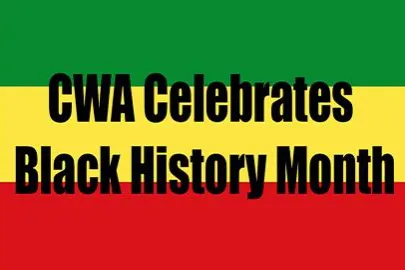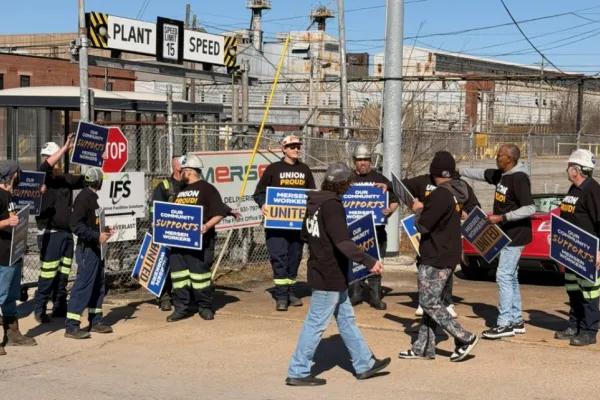Hundreds of Verizon Workers Rally at FCC to Spotlight Jobs Impact of Verizon Wireless-Big Cable Deal
WASHINGTON, D.C. — Verizon workers from five states and Washington D.C. rallied alongside consumer advocates and community organizations in front of the Federal Communications Commission (FCC) today to urge regulators to put conditions on the proposed anti-competitive deal between Verizon subsidiary Verizon Wireless and Big Cable.
CWA representatives and Verizon workers also met with FCC officials to explain why the FCC needs to impose conditions on the deal to ensure it is in the public interest. CWA members also delivered petitions and handwritten letters of concern to FCC officials from more than 130,000 workers and consumers. In addition, they distributed copies of a new report, “Slamming the Door on Our High Speed Future,” which details how the proposed deal will destroy jobs and widen the digital divide.
The Verizon Wireless-Big Cable proposal—which in its current form would allow the companies to cross-market each other’s products, thereby eliminating competition—would kill or prevent the creation of thousands of jobs, widen the digital divide between cities and wealthy suburbs, reduce consumer choice and raise prices. Verizon has cut 14,750 jobs of frontline wireline workers in the eight states and Washington D.C. in its East Cost landline footprint since 2010, and the proposed deal would cost more jobs as the company loses the incentive to expand its FiOS service to new areas.
“At a time of high unemployment, it’s especially important that the FCC consider the jobs impact of this transaction,” said CWA Telecommunications Policy Director Debbie Goldman. “The deal in its current form would have a devastating impact on communities across the county, as tens of thousands of jobs are lost or not created. Jobs should not be sacrificed so that Verizon and Big Cable can profit from anti-competitive practices.”
Employment-related issues have historically been part of the FCC’s public interest review—most recently when the agency reviewed the proposed merger between AT&T and T-Mobile last year.
At the rally, workers stressed the negative jobs impact of then potential deal. “I’ve been sent to work on the FiOS build in the Buffalo suburbs, in Westchester County, Queens, and in the suburbs around my hometown of Albany,” said Adrian Crisp, of CWA Local 1118, where he has been working as a Splicer for 18 years. “The one place I have not been sent is top the City of Albany itself. With this Verizon Wireless-Big Cable deal, we’ll never see FiOS in Albany and other cities. That means there will be less work for me, my wife – who also works at Verizon – and thousands of my co-workers.”
“Companies like Verizon, Cox, and Comcast that have enjoyed monopoly arrangements in Virginia and elsewhere for many years have turned their backs on their employees and this impacts the service we provide customers,” said Richard Hatch, president of CWA local 2201 in Richmond, Virginia. “Verizon has cut more than 1,800 wireline jobs of frontline workers in Virginia so far this year. If this deal goes through, and Verizon’s subsidiary Verizon Wireless sells Cox and Comcast service, we’ll see even more job cuts.”
Consumer advocates from leading organizations including the Consumer Federation of America also voiced their concerns about the deal at the rally. “Consumers and Labor have a common interest in ensuring a dynamic and competitive telecom sector,” said Mark Cooper, Director of Research for the Consumer Federation of America, who spoke at the rally. “As it stands, this deal strangles any hope of competition.”
“Expanding broadband and providing high speed internet services to communities is a critical part of our economic recovery and solving our climate crises,” said Maragrete Strand Rangnes, Director of Labor, Workers’ Rights and Trade Programs for the Sierra Club. “Broadband expansion means reduced carbon emissions, millions of fewer cars on the road, energy efficiency and economic development. The proposed deal could block expansion and stifle progress in these areas.”
If the current deal is approved without conditions, Verizon will lose the incentive to follow through with an expansion of its FiOS service—the nation’s largest all-fiber optic commercial network— to customers and communities that do not currently have access to it. More than 7 million customers—30 percent of the area Verizon now covers with landlines—will be left without the FiOS option for high speed internet and TV.
Thousands of construction techs, cable splicers, installation techs, and call center and support workers in communities across 12 states and Washington D.C. will lose jobs if Verizon ceases its FiOS build-out as a result of the deal.
The jobs impact will be particularly pronounced in cities like Boston, Baltimore, Syracuse, Buffalo, Albany, and other urban areas where Verizon has not yet built out FiOS to make it available to local consumers. There will also be multiplier effects as these workers lose their jobs, creating further job losses in the fiber optic and telecom sectors as well as other industries.
In the face of mounting public concern over the proposed deal, the FCC decided last month to “stop the clock” on its 180-day review of the deal, giving regulators more time to consider the potential impact of the deal on consumers and under-served communities.
Elected officials, consumer advocacy organizations, civil rights organizations, smaller cable providers, telecom workers and consumers have formed coalitions in cities across the northeast where Verizon has failed to build its high-speed FiOS network to push regulators to impose conditions on the deal.
Today, Representative Edward J. Markey-- one of the authors of the 1996 Telecommunications Act--and John Conyers, Ranking Member of the House Judiciary Committee, released a letter calling on the FCC and Department of Justice to scrutinize the deal. Earlier this year, Boston Mayor Thomas Menino detailed the economic dangers of the deal for urban areas in comments to the FCC and last month, nine mayors of cities in New York state signed on to a letter to the Department of Justice and the FCC, expressing deep concern that the deal would have a devastating impact on their communities. Also last month, Senator Herb Kohl of Wisconsin added his voice, raising concerns in a letter the Department of Justice and the FCC.
###
Contact: Chuck Porcari or Elizabeth Schilling, CWA Communications, 202-434-1168, [email protected], [email protected]
Graphic Audio First Contract Negotiations: 02/24/2026
Get Involved: CWA Black History Month Town Hall


